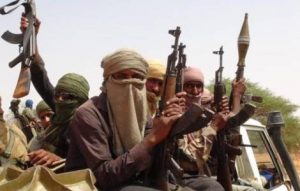Africa has long been a dream destination for intrepid globe trotters. Generations of adventurous souls have embarked on safaris, explored vast savannas and photographed exotic wildlife. Colorful cultural traditions and ethnic foods have added to the continent’s allure. Nowadays, however, international reports are casting worrisome shadows across Africa, especially for those of us who focus on international religious freedom, like reported by newsweek.com.
Last November, shocking news stories reported that ISIS was attacking civilians in Mozambique, abducting women and children and torching homes. Al Jazeera described innocent people—many of them Catholics—being “herded” to their death on a soccer field, where they were systematically decapitated and dismembered. On March 10, the Associated Press announced, “The Biden administration on Wednesday designated two Islamic State affiliates in Mozambique and the Democratic Republic of Congo as ‘foreign terrorist organizations,’ imposing wide-ranging sanctions on the groups.”
In September, a private email reported that a Christian family had been jailed in Somalia. The captives’ crime? They had converted to Christianity and were accused of evangelizing. Several similar arrests have followed.
Likewise, Burkina Faso has been the scene of immense carnage and the displacement of more than a million Christians. The Washington Post described an evening when “gunmen stormed a village in northern Burkina Faso and ordered people who had been chatting outside to lie down. Then the armed strangers checked everyone’s necks, searching for jewelry. They found four men wearing crucifixes—Christians. They executed them.”
All across Africa’s vast expanse, one nation after another has suffered extreme violence, from killings and mutilations to kidnappings and disappearances. As far as religious freedom is concerned, Christian communities are at highest risk because of the marauding jihadis’ religious ideology.
The Guardian reported in January that more than 340 million Christians—one in eight across the world—face high levels of persecution and discrimination. The number of Christians killed for their faith increased by 60 percent over the previous year. More than 90 percent of those deaths were in Africa.
In late February 2021, the Jerusalem Center for Public Affairs (JCPA) published a startling article titled, “Africa Is a Jihadist Playground for the Resurgent Islamic State and al-Qaeda.” The report explained that although the jihadi presence in Africa is nothing new, failure to remove it and neutralize its influence has “encouraged the extremists to penetrate shaky and unstable regimes hit by internal strife, poverty, and ethnic confrontations.” As JCPA explains,
Most of those jihadist groups are the offspring of either the Islamic State or of the al-Qaida organizations and have been active in the Sahel areas for many years…creating a vast web, interconnecting with other jihadist organizations, and extending their presence and destructive activities to Burkina Faso, Benin, the Central African Republic, the Ivory Coast, and Senegal. They have now reached the eastern parts of Africa (Kenya, Uganda, Ethiopia, Somalia, and Mozambique), thus creating a jihadist belt that begins in the Atlantic Ocean shores and reaches the Red Sea and the Indian Ocean.
Clearly Africa is in trouble. It is well documented that Christian communities, churches, clergy and leadership suffer exceptional levels of death and destruction when jihadis attack. No country better exemplifies this tragic reality than Nigeria.
The most populous and commercially significant country in Africa, Nigeria is the site of what has been described as a slow-motion genocide. Tens of thousands of Christians have been massacred there in recent years. In February 2021, a Family Research Council report on Nigeria documented horrifying statistics of mass murders there, primarily at the hands of three Islamist terrorist groups: Boko Haram, Islamic State of West Africa Province and Fulani jihadis. Some local observers assert that these groups cooperate with each other, and may even have discreet support from the current Nigerian government.
Hardly a day passes without accounts of mass kidnappings of Nigerian schoolchildren, Christian clergy and aid workers gunned down, villages torched and churchgoers massacred. In recent days, while hundreds of terrified girls were being kidnapped from their school and held for ransom, extremists released a video of a Christian pastor, Bulus Yikura, pleading for his life.
Calling on President Muhammadu Buhari and other politicians, Yikura exclaimed: “If you want me alive, I beg you in your capacity as president, the governor and our local government chairman to save me from this suffering.” Thankfully, within a week’s time Pastor Bulus’s ransom was paid and he was released by his captors—the ISIS-affiliated Boko Haram terror group.
In a recent conversation, one of America’s most highly respected experts on international religious freedom, former U.S. congressman Frank Wolf, expressed his deep concern about Africa. He explained that Nigeria’s deteriorating security and rapidly escalating violence serves as a warning to the rest of the continent, and indeed, to the whole world. He explained,
Boko Haram is committing genocide against Christians, having killed over 30,000. Boko Haram has killed more civilians in Nigeria than ISIS slaughtered in Iraq and Syria combined. Meanwhile, Fulani militants are committing crimes against humanity and genocidal massacres against Christians…. Nigeria may very well implode. And with continuing economic, political and security deterioration, refugees will soon flee that troubled continent by the millions.
Slowly—too slowly—the United States and other global leaders are beginning to wake up to the horrifying levels of violence suffocating Nigeria and other countries in Africa. Let’s hope that effective, responsive actions will finally be taken. And let’s pray that those actions won’t be too few, or come too late.



